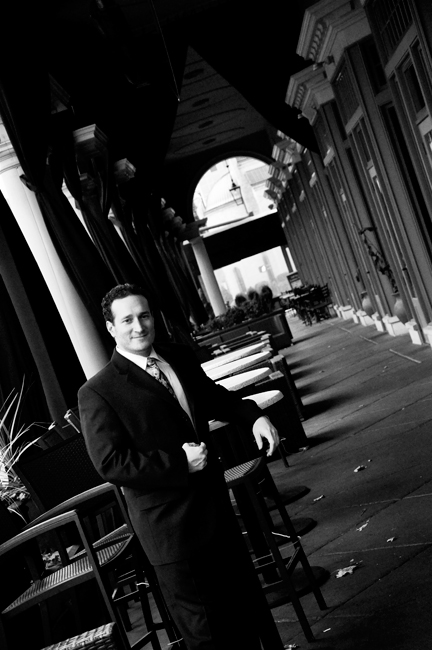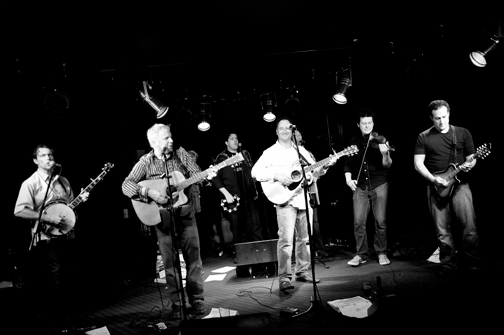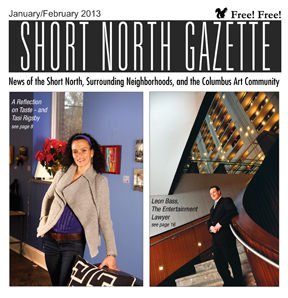
Columbus, Ohio USA
Return to Homepage www.shortnorth.com
Entertainment Lawyer
By Jory Farr
January/February 2013 Issue
Return to Homepage
Return to Features Index
Leon Bass, a luminary among entertainment lawyers in Columbus. Photo © Erica Woodrum When he was young, growing up in Cincinnati, Leon Bass often argued with his parents, teachers and anyone else who had an opposing position on a matter of importance. It was, for the most part, a constructive kind of disagreement, as opposed to yelling and screaming.
“I would prepare to present my case and do so by stating why I disagreed with that person’s decision and present facts and reasoned arguments,” Bass recalls, sounding deliberative. “With my parents, they always respectfully listened – or perhaps humored me – and considered my arguments before issuing a final decision. While I didn’t always win, sometimes I did convince them to modify the situation.”
Such an approach has benefitted Bass years later as a Columbus attorney. Though he is experienced in a number of legal fields, one of his specialties is entertainment law, a practice where he represents everyone from rock musicians, concert promoters and photographers to writers, models and actors. People who have a stereotyped conception of entertainment lawyers as fast-talking, ponytailed scenesters might be surprised to know Bass is mild mannered, clean cut and calm. But underneath that serenity is a thorough knowledge of the law whose smallest details, if ignored, could cost his clients dearly.
“A professor of mine once told me there is no such thing as entertainment law,” Bass says smiling, sipping a coffee at Tasi, a cafe located a few blocks from where he lives in the Short North. “And he’s essentially right. What’s known as entertainment law is part of copyright, trademark, business and contract law. Artists often don’t want to deal with the business side of their work. But it’s crucial. Everybody’s friends until there’s money to fight over. The thing I love about my job is that I get to work with creative people and protect their rights.”
Columbus is not exactly the epicenter of the entertainment industry. But there are a surprising number of artists and performers – from models to filmmakers – and a sizable number of entertainment venues, ranging from theaters to amphitheaters in the city and outlying region. Bass manages to represent both ends of the spectrum.
One of the musicians Bass represents, John Kadlecik, is a guitarist and singer for the band Furthur, a Grateful Dead offshoot that includes founding members Phil Lesh and Bob Weir. But Bass also represents large music festivals, including the Bunbury Festival, held annually in the Cincinnati area along the river, and the All Good Festival, held for the first time near Columbus. This year’s Bunbury Festival included Jane’s Addiction and Weezer; the All Good festival this summer included Bruce Hornsby, members of the Grateful Dead and the Allman Brothers Band. At one time, Bass also represented national acts like Dark Star Orchestra, Quiet Riot, Slaughter and Night Rider.
Bass isn’t the only attorney in Columbus to do entertainment law. But he’s the only attorney who has sustained a full-range entertainment practice over the past 15 years.
“Others have dabbled at it,” Bass says.
His success seems to lie in his grasp of the law and his passion for what he does.
“I really love what I do,” says Bass.
“I love working with those who create music and festivals, create art and photography, write books, and those that do all other things creative and entrepreneurial. It allows me to be part of it. I am a creative person and I need to be surrounded by creativity. [My clients] are inspiring.”
Bass says he also enjoys working with the people that run the business side of entertainment – from promoters, producers and talent buyers to record labels, publishers, managers and agents.
“They all play a key role in the creative process,” he says. “You can’t get the art out to the people without them.”
Those who work with Bass have high praise.
“When I was looking for an attorney to represent my festival,” says Cincinnati-based Bunbury Festival founder Bill Donabedian, “I needed someone with a love of music and experience in all facets of entertainment law. And Leon fit both needs. He really understood the intricacies of the law and the roles and responsibilities in the business. With Leon you’re getting a consultant as much as a lawyer. He looks holistically at my business from all angles.”
For Greg Haas, an author of a thriller called The Butcher’s Thumb, Bass was instrumental in taking the book out of a previous publisher’ control.
“Leon is the combination of a great lawyer and an artist in his own right.” says Haas, who is chairman of the Franklin County Democratic Party. “In the starchy world of the law he’s a breath of fresh air.”
It’s not surprising to find that Bass is a musician himself. He makes no claims of virtuosity. But he does plays mandolin in two Columbus bands: Grassinine, a band that mixes bluegrass with pop and classic rock; and Cowboy Hillbilly Hippy Folk, which plays a blend of what its name implies. The bands include other professionals from Columbus, like Donato’s CEO Tom Krouse and Dr. Terry Davis, a physician with Children’s Hospital.
“Our performances are all for charity,” says Bass. “We enjoying playing together and giving back to the community.”
Bass also is a enthusiast of underwater photography and has a website devoted to what he’s seen diving at reefs around the world.
***
Bass, 40, grew up Jewish and middle class in Montgomery, a Northern suburb of Cincinnati, the son of a computer software consultant.
“My mother worked at times but was mostly a stay-at-home mom,“ Bass recalls. “She was born in Greece and came to Ohio as a child when her family fled the Holocaust.”
The Basses, like most Jewish families, stressed the value of education. But they also nourished a sense of independence and questioning.
“My family, including my parents and extended family have always been very supportive and encouraged me to excel academically. Family and career were always important, but they were always supportive of anything that I wanted to do that made me happy.”
Bass describes his parents as open-minded, especially to his youthful arguments over what was fair, often a sticking point between children and adults.
“I think my parents set the tone for the arguments we had. They were very open to hearing what we thought. They set guidelines and expectations. On any issue, we could state our opinion. It could be something as simple as a curfew. They might say 11 p.m. and we might say midnight or 1 a.m. Some parents might set the curfew in stone. But my parents might compromise and let us have our way. I remember a time when I wanted to go on a trip and they said no. I didn’t win that argument. But there were others I did win.”
For college, Bass went to Michigan State University and quickly joined a band. He had visions of being a rock star, but says he had a rude awakening “I learned that while I was quite capable of playing rhythm guitar, I would likely never make it as a professional musician. In fact, I think that my back-up vocals were so bad that the band used to tell the sound guy to turn my mic off in the house. I heard my vocals through the stage monitor, but I had no idea I was not in the PA mix. Once I figured that out, I considered other options.”
By his sophomore year, Bass was pursuing social sciences, business and taking pre-law studies.
“I guess you could say my course was set by the middle of college. Having learned that entertainment lawyers play an important role in the music industry, I decided to go to law school. It was a justifiable compromise that I do not regret. Today I get paid to work with creative people and argue the law of creative rights every day.”
Grassinine (Left to right front) Ronald Ross, Tom Krause (CEO Donatos), Jamie Davis, Leon Bass. (Back row) Dr. Terry Davis (Nationwide Children’s), who is obstructed, Kirk Horn, and Christina Grote (wife of Donato’s founder Jim Grote), and Matt Opachick of the Wayfarers, (sitting in that night playing fiddle). This shot was taken at Woodlands Tavern. Photo © Erica Woodrum Much of his practice centers around music, and Bass has a philosophical, practical attitude toward the business, which is famously held to be predatory by musicians.
“Record labels are not always bad guys,” says Bass. “They are no different than most of the artists out there. They are trying to compete and make a living in a very competitive industry just like everyone else. Most don’t want to hurt artists, at least intentionally. In many cases, they are actually helping them. They are giving an artist or band a shot that they might not get otherwise.
“Historically the major label deal would give a young artist a tremendous amount of money to go into a studio to make an album with a producer that was inaccessible before. So the label gives a huge opportunity to the band and then the band is shocked when the label wants to make that money back. ‘We sold a million copies,’ they complain. But the deal structure was a loan that the band didn’t have to repay. My role is not to sway them one way or another. It’s to give them enough information to make an informed decision.”
Though the annals of entertainment law are strewn with examples of bad deals, many bands do not take precautions to protect themselves, says Bass. This is particularly true of music.
”The most common mistake I see by artists is a failure to take basic steps to deal with business issues. If they are professional musicians, whether they like it or not, they are in business. Music is their business. Yet many musicians avoid key business and legal items like registering copyrights in songs and sound recordings, searching and registering trademarks, and entering into written agreements with their band members.
“They often ignore things like getting written agreements with club and concert venue owners, album artwork graphic designers, studio musicians, and co-songwriters. These can end up being fatal mistakes that could ultimately cost the artist hundreds of thousands of dollars or even decimate a career. There is no question that is worth the up-front costs to deal with these issues before they become a problem.”
The biggest misconception of entertainment law, Bass says, is that the lawyers get deals for bands.
“The truth is, the bands get the offers and we protect their rights contractually. Historically, some entertainment lawyers did get bands deals. But those lawyers typically got involved when the band was about to be signed, perhaps in a bidding war. But today the record labels know about you if you’ve got a social networking following and are on Internet radio.”
Recently, Bass became of counsel for the large firm of Taft Stettinius & Hollister, a 360-plus attorney firm with offices located in Columbus, as well as Cincinnati, Cleveland, Dayton, Indianapolis, Northern Kentucky, and Phoenix.
“Having a large law firm like Taft, with the best lawyers available, is helpful to me and the client. When one of my clients comes to me with a question that’s outside my expertise, I can go to an attorney at Taft and solve the problem. I also work with the firm’s clients.”
Bass says he loves living in the Short North.
“It’s the best part of Columbus. It’s vibrant. It’s exciting. You can walk to all the great restaurants. I use the area for entertaining clients. I’ll give dinner parties at my house. Fifteen to 20 years ago it was a high crime area. It wasn’t unheard of to hear gunshots. Today, I live among doctors lawyers, executives, retired people. There’s a real community here.”Leon Bass will perform with his group Grassinine on Saturday, February 2, 2013, from 8 to 11 p.m. at Woodlands Tavern, 1200 West Third Ave. in Grandview.
© 2013 Short North Gazette, Columbus, Ohio. All rights reserved.
Return to Homepage www.shortnorth.com


